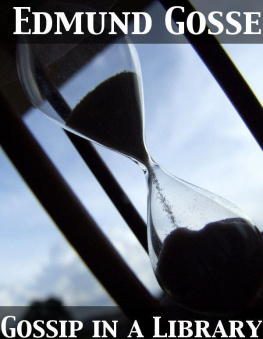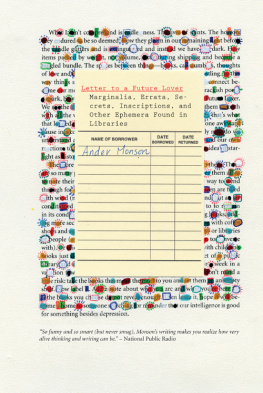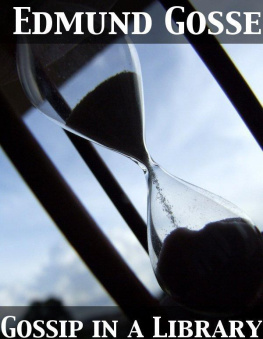The Project Gutenberg eBook, Gossip in a Library, by Edmund Gosse
This eBook is for the use of anyone anywhere at no cost and withalmost no restrictions whatsoever. You may copy it, give it away orre-use it under the terms of the Project Gutenberg License includedwith this eBook or online at www.gutenberg.net
Title: Gossip in a Library
Author: Edmund Gosse
Release Date: March 18, 2004 [eBook #11628]
Language: English
***START OF THE PROJECT GUTENBERG EBOOK GOSSIP IN A LIBRARY***
E-text prepared by the Project Gutenberg Online Distributed ProofreadingTeam
GOSSIP IN A LIBRARY
EDMUND GOSSE
1913
OTHER WORKS BY MR. EDMUND GOSSE
Northern Studies. 1879.
Life of Gray. 1882.
Seventeenth-Century Studies. 1883.
Life of Congreve. 1888.
A History of Eighteenth-Century Literature. 1889
Life of Philip Henry Gosse, F.R.S. 1890.
The Secret of Narcisse: a Romance. 1892.
Questions at Issue. 1893.
Critical Kit-Kats. 1896.
A Short History of Modern English Literature. 1897.
Life and Letters of John Donne. 1899.
Hypolympia. 1901.
French Profiles. 1904.
Life of Jeremy Taylor. 1904.
Life of Sir Thomas Browne. 1905.
Father and Son. 1907.
Life of Ibsen. 1908.
Two Visits to Denmark. 1911.
Collected Poems. 1911.
Portraits and Sketches. 1912.
CONTENTS
INTRODUCTORY
CAMDEN'S "BRITANNIA"
A MIRROR FOR MAGISTRATES
A POET IN PRISON
DEATH'S DUEL
GERARD'S HERBAL
PHARAMOND
A VOLUME OF OLD PLAYS
A CENSOR OF POETS
THE ROMANCE OF A DICTIONARY
LADY WINCHILSEA'S POEMS
AMASIA
LOVE AND BUSINESS
WHAT ANN LANG READ
CATS
SMART'S POEMS
POMPEY THE LITTLE
THE LIFE OF JOHN BUNGLE
BEAU NASH
THE NATURAL HISTORY OF SELBORNE
THE DIARY OF A LOVER OF LITERATURE
PETER BELL AND HIS TORMENTORS
THE FANCY
ULTRA-CREPIDARIUS
THE DUKE OF RUTLAND'S POEMS
IONICA
THE SHAVING OF SHAGPAT
INDEX
O blessed Letters, that combine in one
All ages past, and make one live with all:
By you we doe conferre with who are gone,
And the dead-living unto councell call:
By you th' unborne shall have communion
Of what we feele, and what doth us befall.
SAM. DANIEL Musophilus. 1602.
INTRODUCTORY
It is curious to reflect that the library, in our customary sense,is quite a modern institution. Three hundred years ago there were nopublic libraries in Europe. The Ambrosian, at Milan, dates from 1608;the Bodleian, at Oxford, from 1612. To these Angelo Rocca added his inRome, in 1620. But private collections of books always existed, andthese were the haunts of learning, the little glimmering hearths overwhich knowledge spread her cold fingers, in the darkest ages of theworld. To-day, although national and private munificence has increasedthe number of public libraries so widely that almost every reader iswithin reach of books, the private library still flourishes. Thereare men all through the civilised world to whom a book is a jewelanindividual possession of great price. I have been asked to gossipabout my books, for I also am a bibliophile. But when I think of thegreat collections of fine books, of the libraries of the magnificent,I do not know whether I dare admit any stranger to glance at mine.The Mayor of Queenborough feels as though he were a very importantpersonage till Royalty drives through his borough without noticing hisscarf and his cocked hat; and then, for the first time, he observeshow small the Queenborough town-hall is. But if one is to gossip aboutbooks, it is, perhaps, as well that one should have some limits. Iwill leave the masters of bibliography to sing of greater matters, andwill launch upon no more daring voyage than one autour de ma pauvrebibliothque.
I have heard that the late Mr. Edward Solly, a very pious andworshipful lover of books, under several examples of whose book-plateI have lately reverently placed my own, was so anxious to fly alloutward noise that he built himself a library in his garden. I havebeen told that the books stood there in perfect order, with therose-spray flapping at the window, and great Japanese vases exhalingsuch odours as most annoy an insect-nostril. The very bees would cometo the window, and sniff, and boom indignantly away again. The silencethere was perfect. It must have been in such a secluded library thatChristian Mentzelius was at work when he heard the male book-worm flaphis wings, and crow like a cock in calling to his mate. I feel surethat even Mentzelius, a very courageous writer, would hardly pretendthat he could hear such a "shadow of all sound" elsewhere. That isthe library I should like to have. In my sleep, "where dreams aremultitude," I sometimes fancy that one day I shall have a library ina garden. The phrase seems to contain the whole felicity of man"alibrary in a garden!" It sounds like having a castle in Spain, or asheep-walk in Arcadia, and I suppose that merely to wish for it is tobe what indignant journalists call "a faddling hedonist."
In the meanwhile, my books are scattered about in cases in differentparts of a double sitting-room, where the cats carouse on one side,and the hurdy-gurdy man girds up his loins on the other. A friendof Boethius had a library lined with slabs of ivory and pale greenmarble. I like to think of that when I am jealous of Mr. FrederickLocker-Lampson, as the peasant thinks of the White Czar when hismaster's banqueting hall dazzles him. If I cannot have cabinets ofebony and cedar, I may just as well have plain deal, with common glassdoors to keep the dust out. I detest your Persian apparatus.
It is a curious reflection, that the ordinary private person whocollects objects of a modest luxury, has nothing about him so old ashis books. If a wave of the rod made everything around him disappearthat did not exist a century ago, he would suddenly find himself withone or two sticks of furniture, perhaps, but otherwise alone with hisbooks. Let the work of another century pass, and certainly nothingbut these little brown volumes would be left, so many caskets fullof passion and tenderness, disappointed ambition, fruitless hope,self-torturing envy, conceit aware, in maddening lucid moments, of itsown folly. I think if Mentzelius had been worth his salt, those earsof his, which heard the book-worm crow, might have caught the echo ofa sigh from beneath many a pathetic vellum cover. There is somethingawful to me, of nights, and when I am alone, in thinking of all thesouls imprisoned in the ancient books around me. Not one, I suppose,but was ushered into the world with pride and glee, with a flushedcheek and heightened pulse; not one enjoyed a career that in allpoints justified those ample hopes and flattering promises.
The outward and visible mark of the citizenship of the book-lover ishis book-plate. There are many good bibliophiles who abide in thetrenches, and never proclaim their loyalty by a book-plate. They arewith us, but not of us; they lack the courage of their opinions; theycollect with timidity or carelessness; they have no need for themorrow. Such a man is liable to great temptations. He is brought faceto face with that enemy of his species, the borrower, and dares notspeak with him in the gate. If he had a book-plate he would say, "Oh!certainly I will lend you this volume, if it has not my book-plate init; of course, one makes a rule never to lend a book that has." Hewould say this, and feign to look inside the volume, knowing rightwell that this safeguard against the borrower is there already.To have a book-plate gives a collector great serenity andself-confidence. We have laboured in a far more conscientious spiritsince we had ours than we did before. A learned poet, Lord De Tabley,wrote a fascinating volume on book-plates, some years ago, withcopious illustrations. There is not, however, one specimen in his bookwhich I would exchange for mine, the work and the gift of one of themost imaginative of American artists, the late Edwin A. Abbey. Itrepresents a very fine gentleman of about 1610, walking in broadsunlight in a garden, reading a little book of verses. The name iscoiled around him, with the motto,
Next page






